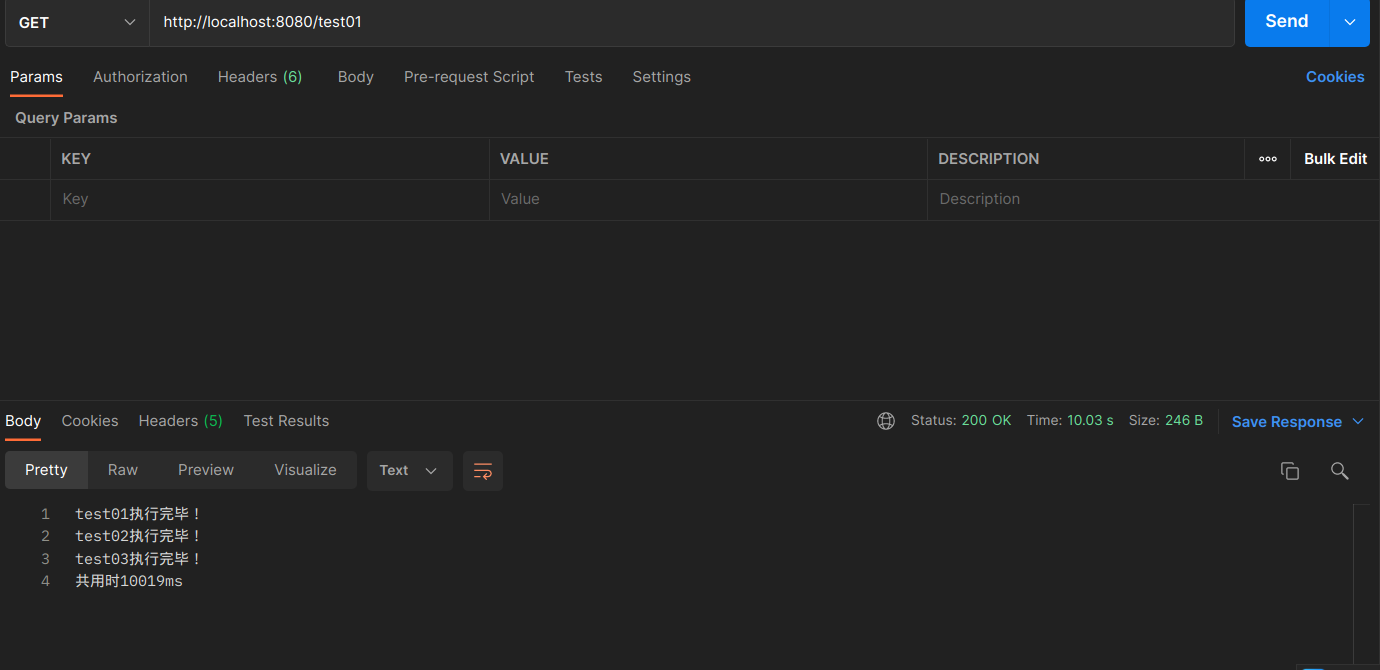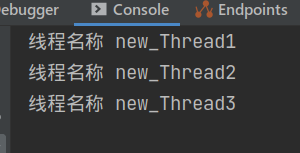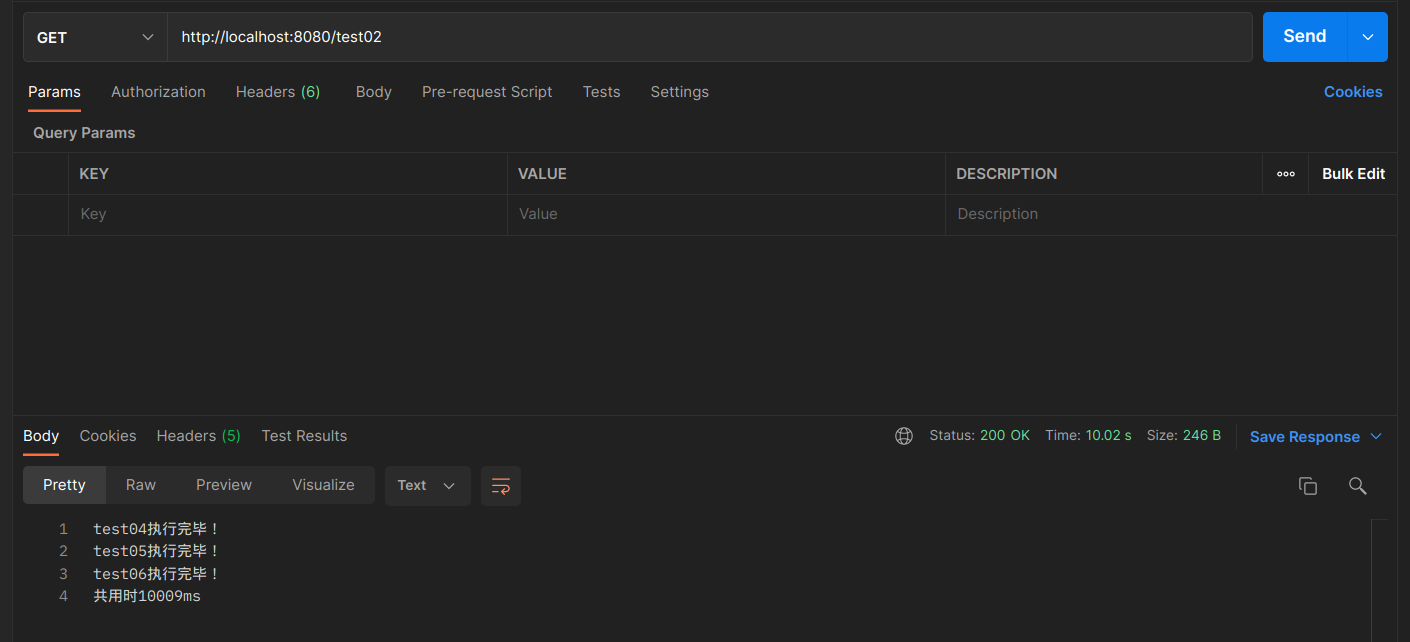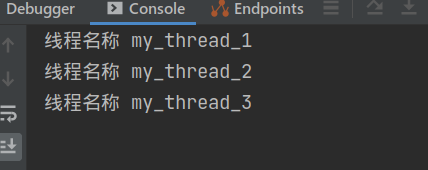catalogue
Thread pool
Thread pool is to create some threads first, and their collection is called thread pool. Using thread pool can improve performance. When the system starts, the thread pool creates a large number of idle threads. The program passes a task to the thread pool, and the thread pool will start a thread to execute the task. After execution, the thread will not die, but return to the thread pool to become idle again and wait for the execution of the next task.
Global thread pool
For spring boot, it is very convenient to configure the global thread pool. Add the configuration to initialize a thread pool
@Configuration
@EnableAsync
public class ExecutorConfig {
@Bean("new_Thread")
public Executor carSocketExecutor() {
//Gets the number of cores for the current machine
int cpuNum = Runtime.getRuntime().availableProcessors();
ThreadPoolTaskExecutor executor = new ThreadPoolTaskExecutor();
//Configure the number of core threads
executor.setCorePoolSize(cpuNum);
//Configure maximum threads
executor.setMaxPoolSize(cpuNum * 2);
//Configure queue size
executor.setQueueCapacity(100);
//Thread lifetime
executor.setKeepAliveSeconds(60);
//Configure the name prefix of threads in the thread pool
executor.setThreadNamePrefix("new_Thread");
// CALLER_RUNS: the task is not executed in the new thread, but in the thread of the caller
executor.setRejectedExecutionHandler(new ThreadPoolExecutor.CallerRunsPolicy());
//Perform initialization
executor.initialize();
return executor;
}
If the returned value is tested here, the return value type is Future. The @ Async annotation indicates that the method obtains threads from the thread pool for execution, and the thread pool name is not required
@Override
@Async("new_Thread")
public Future<String> testService01() {
try {
System.out.println("Thread name " + Thread.currentThread().getName());
Thread.sleep(10000L);
} catch (InterruptedException e) {
e.printStackTrace();
}
return new AsyncResult<String>("test01 Execution complete!");
}
@Override
@Async("new_Thread")
public Future<String> testService02() {
try {
System.out.println("Thread name " + Thread.currentThread().getName());
Thread.sleep(10000L);
} catch (InterruptedException e) {
e.printStackTrace();
}
return new AsyncResult<String>("test02 Execution complete!");
}
@Override
@Async("new_Thread")
public Future<String> testService03() {
try {
System.out.println("Thread name " + Thread.currentThread().getName());
Thread.sleep(10000L);
} catch (InterruptedException e) {
e.printStackTrace();
}
return new AsyncResult<String>("test03 Execution complete!");
}
Test methods. Because of multithreading, the main thread will not wait for the return value of each method, so first put the return value results into a collection until all methods start to execute, and then traverse them. The get () method in Future can get the real return value. Only when this method is called, The main thread will wait for the result in the method to return
@GetMapping("/test01")
public StringBuilder test01() {
//Return result set
List<Future<String>> results = new ArrayList<>();
//Response results
StringBuilder restStr = new StringBuilder();
//start time
Long startTime = System.currentTimeMillis();
results.add(multithreadingService.testService01());
results.add(multithreadingService.testService02());
results.add(multithreadingService.testService03());
for (Future<String> result : results) {
try {
restStr.append(result.get()).append("\n");
} catch (Exception e) {
e.printStackTrace();
}
}
//End time
Long endTime = System.currentTimeMillis();
restStr.append("Shared time").append(endTime - startTime).append("ms");
return restStr;
}Looking at the test results, we can see that the three methods share about 10s. At the beginning, I set the execution time of each method to 10s, so The test was successful!

Local thread pool
Creating a local thread pool can be implemented using the methods in the Executors class. This article demonstrates the creation of a fixed length thread pool
The test method is the same as the previous global thread pool
@Override
public String testService04() {
try {
System.out.println("Thread name " + Thread.currentThread().getName());
Thread.sleep(10000L);
} catch (InterruptedException e) {
e.printStackTrace();
}
return "test04 Execution complete!";
}
@Override
public String testService05() {
try {
System.out.println("Thread name " + Thread.currentThread().getName());
Thread.sleep(10000L);
} catch (InterruptedException e) {
e.printStackTrace();
}
return "test05 Execution complete!";
}
@Override
public String testService06() {
try {
System.out.println("Thread name " + Thread.currentThread().getName());
Thread.sleep(10000L);
} catch (InterruptedException e) {
e.printStackTrace();
}
return "test06 Execution complete!";
}@GetMapping("/test02")
public StringBuilder test02() {
//Return result set
List<Future<String>> results = new ArrayList<>();
//Response results
StringBuilder restStr = new StringBuilder();
//start time
Long startTime = System.currentTimeMillis();
//Create a fixed length thread pool (indicating that the maximum concurrency is 3, and wait if the queue exceeds 3)
ExecutorService executorService = Executors.newFixedThreadPool(POOL_COUNT, new MyThreadFactory("my_thread"));
results.add(executorService.submit(new Callable<String>() {
@Override
public String call() throws Exception {
Thread.interrupted();
return multithreadingService.testService04();
}
}));
results.add(executorService.submit(new Callable<String>() {
@Override
public String call() throws Exception {
Thread.interrupted();
return multithreadingService.testService05();
}
}));
results.add(executorService.submit(new Callable<String>() {
@Override
public String call() throws Exception {
Thread.interrupted();
return multithreadingService.testService06();
}
}));
for (Future<String> result : results) {
try {
restStr.append(result.get()).append("\n");
} catch (Exception e) {
e.printStackTrace();
} finally {
//Close thread pool
executorService.shutdown();
}
}
//End time
Long endTime = System.currentTimeMillis();
restStr.append("Shared time").append(endTime - startTime).append("ms");
return restStr;
}The thread factory here mainly gives a name to the thread. In addition, some log information such as thread creation time and end time can be added according to business requirements
@Data
public class MyThreadFactory implements ThreadFactory {
//Thread name
private String poolName;
//Thread number
private int threadCount;
public MyThreadFactory(String poolName) {
this.poolName = poolName;
threadCount = 0;
}
@Override
public Thread newThread(Runnable runnable) {
threadCount++;
return new Thread(runnable, poolName + "_" +threadCount);
}test result

